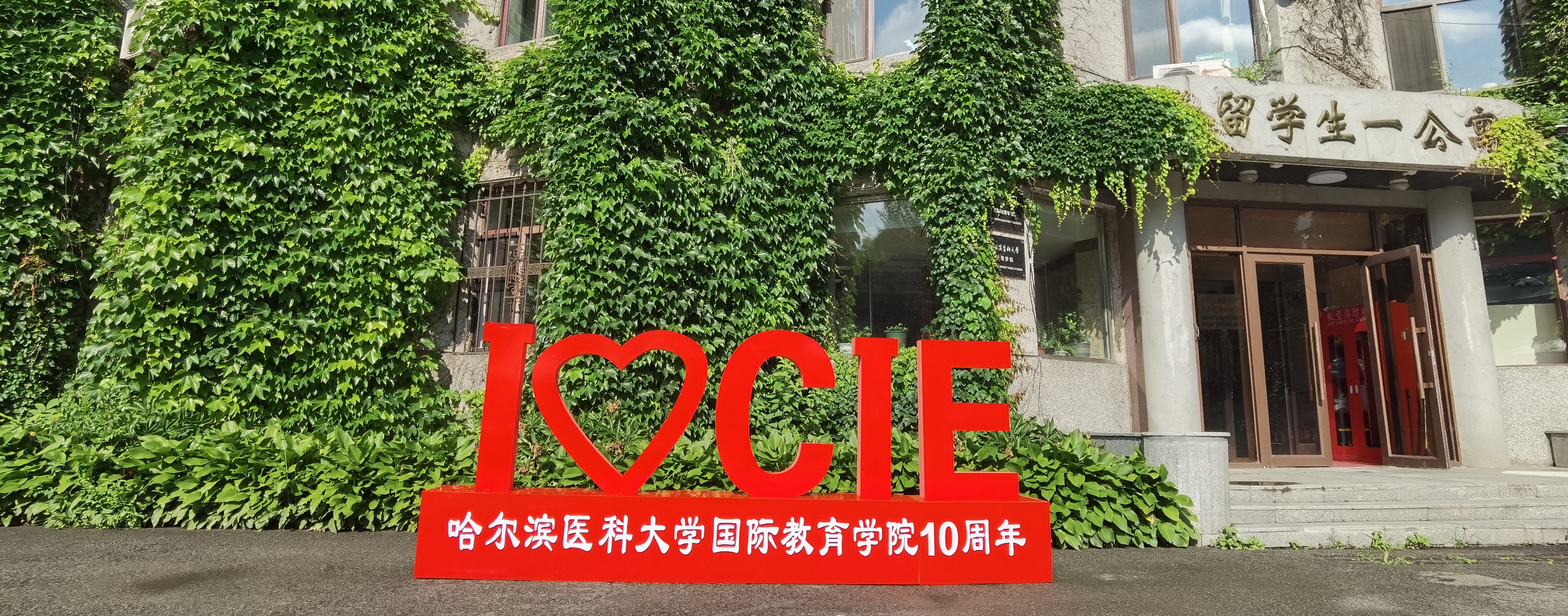近日,我校国际教育学院阿富汗籍硕士二年级留学生Abdullah Yosufi(中文名:阿布)在仲雷教授团队的指导下,以第一作者身份完成的综述论文《Internal Mammary Lymph Nodes in Breast Cancer: A Comprehensive Review of Anatomy, Imaging, Biopsy Considerations, Clinical Implications, and Future Directions》正式发表在Current Problems in Diagnostic Radiology杂志上。论文围绕乳腺癌内乳淋巴结的影像学表现、解剖特点、活检要点及临床意义进行了系统而全面的总结,体现了扎实的学术训练成果。
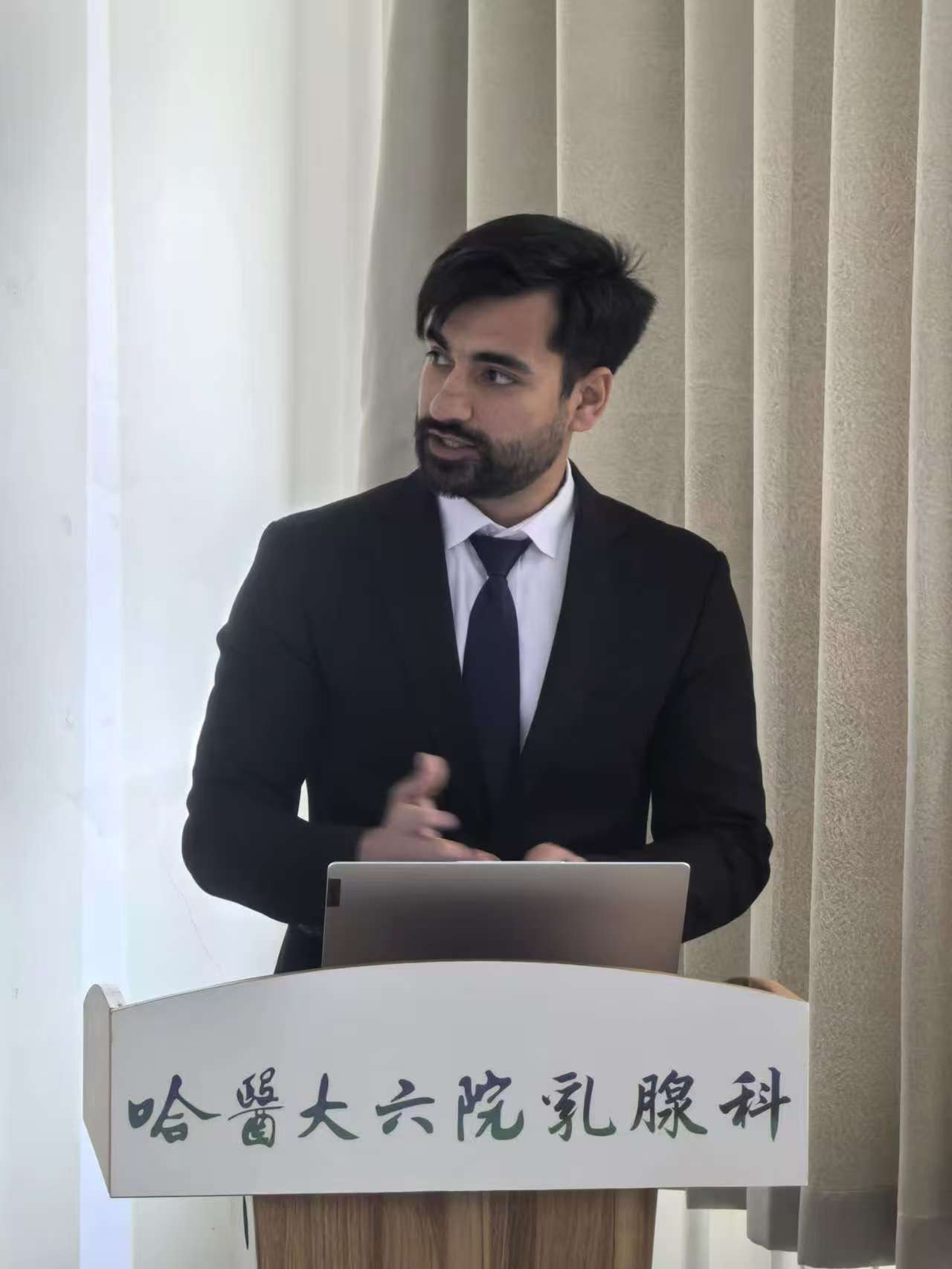
阿布的研究工作由哈尔滨医科大学附属第六医院乳腺外科团队提供全程指导。团队在文献筛选、研究逻辑梳理、图表制作和学术语言校对等方面进行了细致专业的教学。在跨文化环境下,导师团队采用分步骤培训、实时反馈与反复打磨相结合的方式,帮助阿布逐步建立规范的科研思维模式,实现从“学习者”向“研究者”的稳步过渡。与此同时,国际学院在语言学习、学术适应和文化融入等方面提供的系统支持,也为阿布顺利开展科研创造了良好条件。此次论文的发表,是团队指导与学院保障共同作用的成果,更是我校持续提升来华留学生教育质量的生动体现。
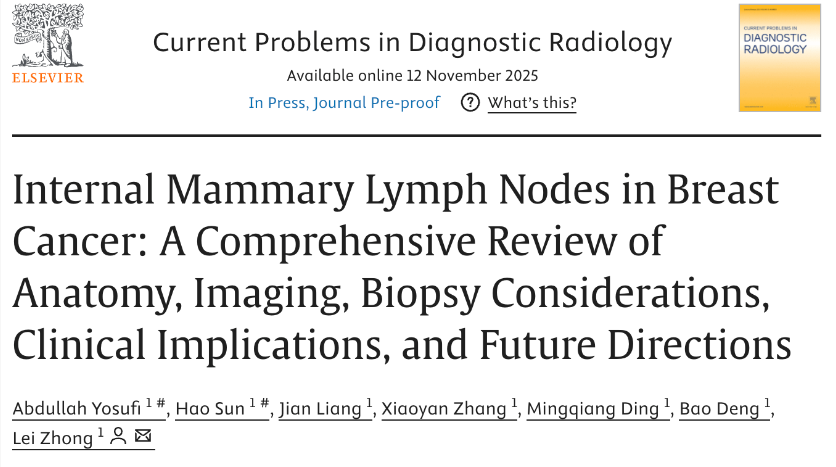 作为来自阿富汗的留学生,阿布初到中国时,对语言环境、科研模式和学习方式都感到新鲜而富有挑战。随着逐渐融入学校与科研团队,他也积累了许多深刻的体会:“来到中国学习,是我人生中非常重要的选择。刚来的时候,我确实在语言和文化上有很多不适应,也担心自己能否融入医学学习和科研。但在哈尔滨医科大学,老师们非常耐心、细致。无论是文献阅读、科研思维,还是论文中每一段、每一句的表达,老师和团队成员都会一步一步指导我、鼓励我。团队里的同学也十分友好,主动帮助我理解概念、适应研究流程,让我在异国他乡感到被支持、被尊重。在这样的氛围中,我逐渐建立了信心,也越来越能够独立完成科研任务。论文得以顺利发表,我感到非常自豪,也非常感谢这段经历。它让我看到自己的成长,更坚定了我继续从事医学研究的信念。”目前,阿布已顺利完成硕士阶段的开题答辩,并积极参与2025年哈尔滨医科大学第十九届“挑战杯”,在校赛决赛中获得团体三等奖。
作为来自阿富汗的留学生,阿布初到中国时,对语言环境、科研模式和学习方式都感到新鲜而富有挑战。随着逐渐融入学校与科研团队,他也积累了许多深刻的体会:“来到中国学习,是我人生中非常重要的选择。刚来的时候,我确实在语言和文化上有很多不适应,也担心自己能否融入医学学习和科研。但在哈尔滨医科大学,老师们非常耐心、细致。无论是文献阅读、科研思维,还是论文中每一段、每一句的表达,老师和团队成员都会一步一步指导我、鼓励我。团队里的同学也十分友好,主动帮助我理解概念、适应研究流程,让我在异国他乡感到被支持、被尊重。在这样的氛围中,我逐渐建立了信心,也越来越能够独立完成科研任务。论文得以顺利发表,我感到非常自豪,也非常感谢这段经历。它让我看到自己的成长,更坚定了我继续从事医学研究的信念。”目前,阿布已顺利完成硕士阶段的开题答辩,并积极参与2025年哈尔滨医科大学第十九届“挑战杯”,在校赛决赛中获得团体三等奖。
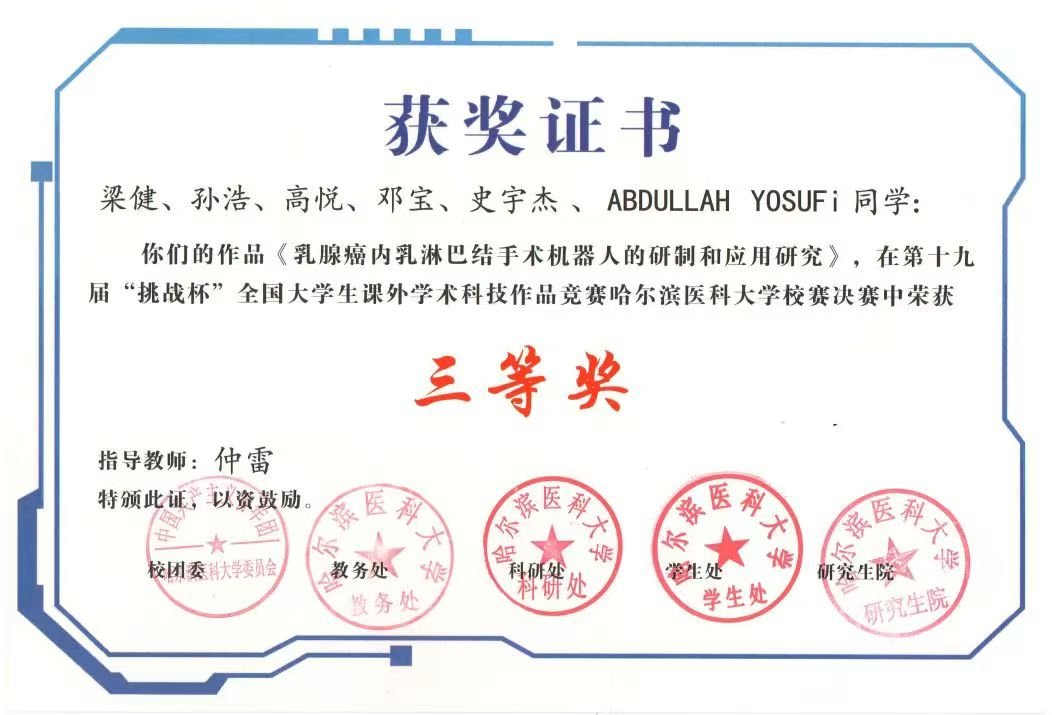 作为此次科研指导团队负责人,仲雷教授首次承担系统培养来华留学生的任务。面对语言差异、文化背景不同及科研习惯存在差异等挑战,仲教授带领团队在教学方式、沟通方法和训练流程上进行了大量探索,投入了比以往更多的时间和精力,力求为留学生提供同等质量且更具适配性的科研指导。团队在跨文化教学上的实践,也为今后医学类留学生培养积累了宝贵经验。“作为第一次指导留学生的导师,我们在语言沟通、文化理解和科研习惯上都经历了磨合与探索。阿布的认真与坚持给我们留下了深刻印象。在团队的合作与持续训练下,他逐渐掌握科研方法并顺利发表论文,这不仅是他的成长,也是我们一次宝贵的跨文化教学经历。”目前,仲雷教授团队正在联合兄弟院校进一步总结来华医学留学生培养模式,已完成《在华医学留学生学习质量评估及其影响因素的多中心调查》文章的撰写,并正在投稿中。相关研究的持续推进,不仅将为来华医学教育提供更具实证性的参考,也将为更多国际学生在中国实现学术梦想创造更优越的条件。
作为此次科研指导团队负责人,仲雷教授首次承担系统培养来华留学生的任务。面对语言差异、文化背景不同及科研习惯存在差异等挑战,仲教授带领团队在教学方式、沟通方法和训练流程上进行了大量探索,投入了比以往更多的时间和精力,力求为留学生提供同等质量且更具适配性的科研指导。团队在跨文化教学上的实践,也为今后医学类留学生培养积累了宝贵经验。“作为第一次指导留学生的导师,我们在语言沟通、文化理解和科研习惯上都经历了磨合与探索。阿布的认真与坚持给我们留下了深刻印象。在团队的合作与持续训练下,他逐渐掌握科研方法并顺利发表论文,这不仅是他的成长,也是我们一次宝贵的跨文化教学经历。”目前,仲雷教授团队正在联合兄弟院校进一步总结来华医学留学生培养模式,已完成《在华医学留学生学习质量评估及其影响因素的多中心调查》文章的撰写,并正在投稿中。相关研究的持续推进,不仅将为来华医学教育提供更具实证性的参考,也将为更多国际学生在中国实现学术梦想创造更优越的条件。
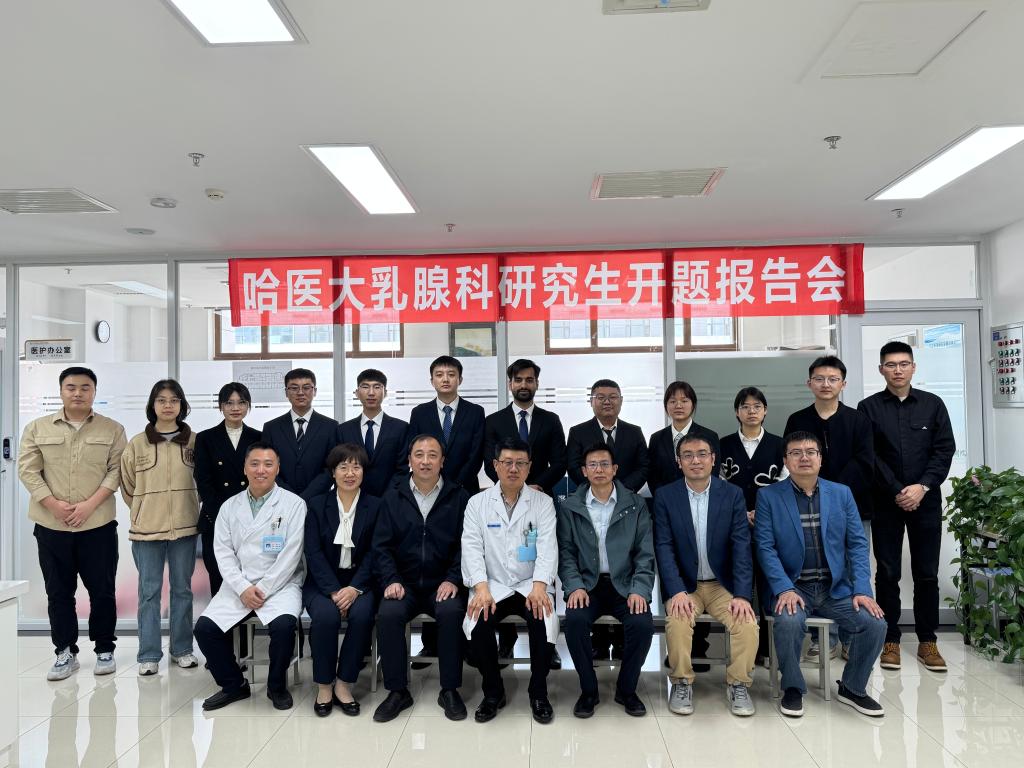
阿布的成长经历,是哈尔滨医科大学来华留学生培养体系不断完善的一个缩影。从跨文化支持到科研训练、从团队协作到个人突破,这段旅程不仅见证了他从学习者到研究者的蜕变,也展现了我校在医学教育国际化道路上的责任与担当。未来,学校将继续深化国际化办学理念,为更多来自世界各地的学生提供专业、温暖且高质量的医学教育平台。
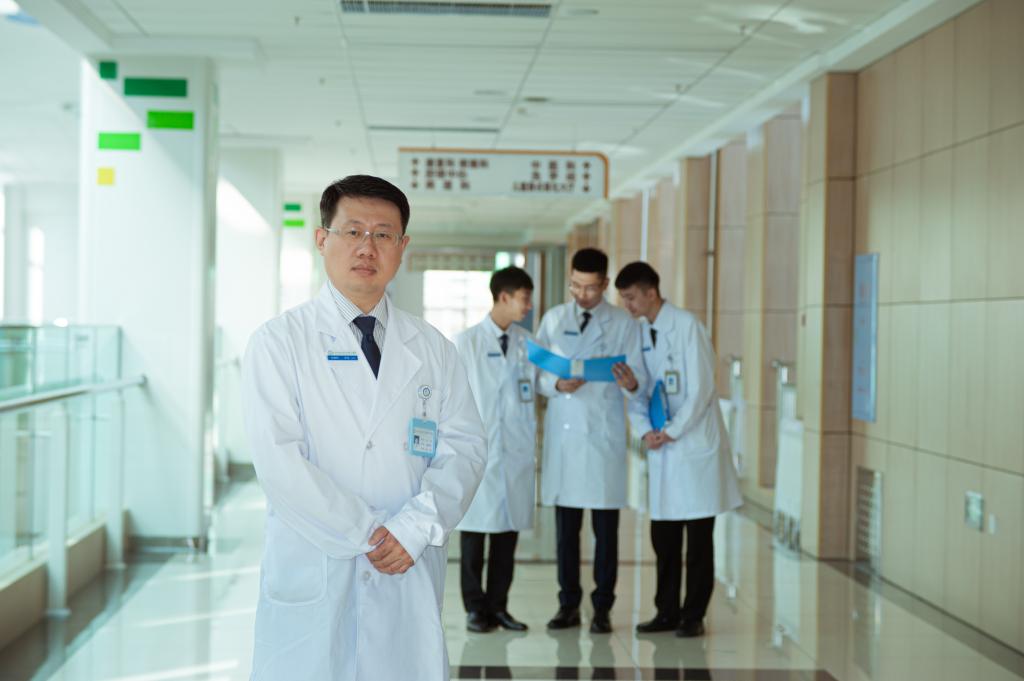
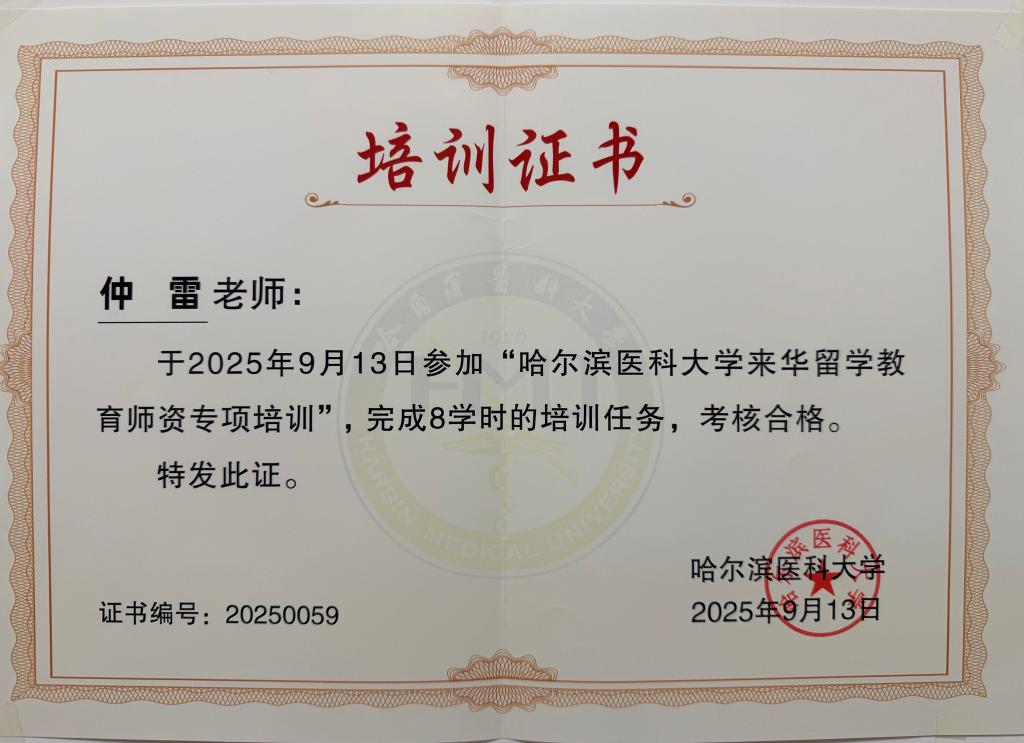
Research Growth on the Academic Journey: The Story of International Student Abdullah Yosufi at Harbin Medical University
Recently, Abdullah Yosufi (Chinese name: Abu), a Afghan second-year master’s student at the College of International Education of Harbin Medical University, published a comprehensive review titled “Internal Mammary Lymph Nodes in Breast Cancer: A Comprehensive Review of Anatomy, Imaging, Biopsy Considerations, Clinical Implications, and Future Directions” as the first author in the journal Current Problems in Diagnostic Radiology. The paper was completed under the guidance of Professor Zhong Lei’s research team.
His research was closely supervised by the Breast Surgery Department of the Sixth Affiliated Hospital of Harbin Medical University. The article provides a systematic and thorough synthesis of imaging features, anatomical characteristics, biopsy techniques, and clinical implications of internal mammary lymph nodes in breast cancer, demonstrating Abdullah Yosufi’s solid academic training. The team offered meticulous guidance throughout the process, including literature screening, logical structuring, figure preparation, and academic language polishing. In this cross-cultural setting, the supervisors adopted a step-by-step approach—combining real-time feedback and repeated refinement—to help Abdullah Yosufi gradually establish a standardized research mindset and transition steadily from a “learner” to a “researcher”. In addition, the systematic support provided by the College of International Education in language learning, academic adaptation, and cultural integration created favorable conditions for Abdullah Yosufi’s research endeavors. The publication of this paper reflects not only the joint efforts of the research team and the college’s support system but also serves as a vivid example of Harbin Medical University’s continuous improvement in the quality of education for international students.
As a student from Afghanistan, Abdullah Yosufi found the language environment, research models, and learning methods both novel and challenging when he first arrived in China. Over time, as he integrated into the university and his research team, he gained profound insights: “Studying in China has been one of the most important decisions in my life. At first, I struggled with the language and cultural differences, and I wasn’t sure if I could adapt to medical studies and research. But at Harbin Medical University, the professors have been incredibly patient and detail-oriented. Whether it was reading literature, developing research thinking, or polishing each section and sentence of the paper, my mentors and teammates guided and encouraged me step by step. The students in the team were also very friendly—they helped me understand concepts and adapt to the research process, making me feel supported and respected even far from home. In such an environment, I gradually built confidence and became more capable of conducting research independently. I feel proud that my paper has been published, and I am deeply grateful for this experience. It has shown me my own growth and strengthened my determination to pursue medical research.”Currently, Abdullah Yosufi has successfully completed his master’s thesis proposal defense and actively participated in the 19th “Challenge Cup” competition at Harbin Medical University in 2025, winning a third prize in the university-level finals.
Professor Zhong Lei, the principal supervisor of the research team, took on the task of systematically mentoring an international student for the first time. Faced with challenges such as language barriers, cultural differences, and variations in research habits, Professor Zhong and his team explored various teaching methods, communication strategies, and training procedures, investing significantly more time and effort than usual to provide high-quality and well-adapted research guidance. Their cross-cultural teaching practices have laid a valuable foundation for future training of international medical students. “As first-time supervisors of an international student, we went through a process of adaptation in terms of language communication, cultural understanding, and research habits. Abdullah Yosufi’s diligence and persistence left a deep impression on us. Through teamwork and continuous training, he gradually mastered research methods and successfully published his paper. This marks not only his personal growth but also an invaluable cross-cultural teaching experience for our team.” Currently, Professor Zhong Lei’s team is collaborating with other universities to further summarize training models for international medical students in China. They have completed a manuscript titled“A Multicenter Survey on Learning Quality Assessment and Influencing Factors of International Medical Students in China,”which is now under review. The ongoing research will not only provide evidence-based references for international medical education in China but also create more favorable conditions for international students to achieve their academic dreams in China.
Abdullah Yosufi’s journey is a reflection of the continuous improvement in the training system for international students at Harbin Medical University. From cross-cultural support and research training to teamwork and personal breakthroughs, his experience illustrates not only his own transformation from a learner to a researcher but also the university’s commitment and responsibility in advancing the internationalization of medical education. Moving forward, the university will continue to deepen its international education philosophy, offering more students from around the world a professional, supportive, and high-quality platform for medical studies.
